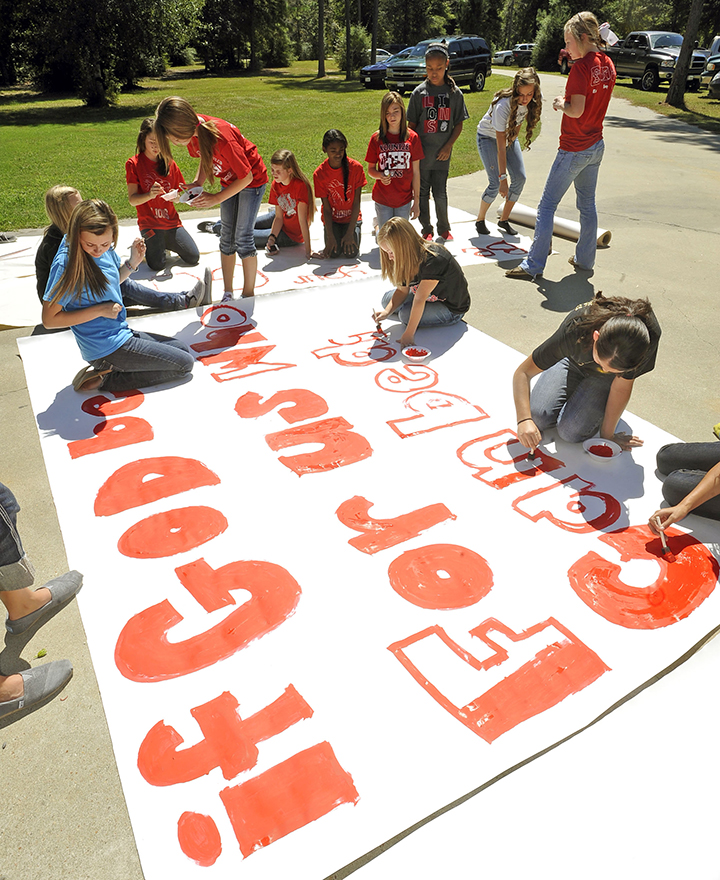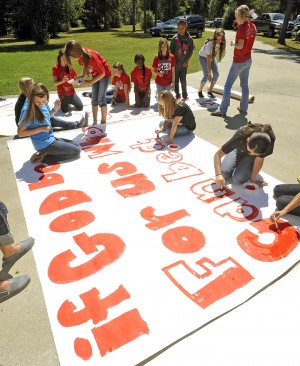

Associated Press
By Linda Nguyen
Staff Writer
Cheerleaders at a Texas public school have jumped headfirst into litigation that could have implications on the division of church and state and the First Amendment as it affects the public school system.
The Kountze High School cheerleaders are suing the school for the First Amendment right to use Bible verses on their run-through banners at football games.
The cheerleaders have been including Bible verses on banners displayed in public at school football games since the beginning of the year.
After the superintendent of the Kountze public school district received a complaint from The Freedom from Religion Foundation, the cheerleaders were told to stop, although District Judge Steve Thomas granted an injunction on Thursday allowing them to continue using religious-themed banners at games.
A trial is set for June 24.
Dr. Charles McDaniel, former associate director of the Church State Institute and assistant professor for the Baylor Interdisciplinary Core, said any constitutional question involving this case will come down to the banners the cheerleaders were using.
“There is a case, Tinker v. Des Moines, involving students who wore black armbands protesting the Vietnam War,” McDaniel said. “David Starnes, the cheerleaders’ lead attorney, is suggesting that the Tinker case is the precedent.”
McDaniel said precedent is important in court cases because courts will normally uphold previous decisions.
“The court has a tendency to let a decision stand unless there is a significant reason for change,” McDaniel said.
In Tinker v. Des Moines, 15-year old John Tinker, 13-year old Mary Beth Tinker and 16-year old Christopher Eckhardt wore black armbands to their public schools in protest of the Vietnam war.
The students sued in federal court but lost because the court felt that the school acted out of reasonable fear that wearing those armbands would disrupt order in the school.
The case made its way up to the Supreme Court, which overturned the federal court’s decision allowing the students to wear their armbands.
The decision was decided 7-2 stating that the First Amendment applies to public schools and administrators have to have constitutionally valid reasons to regulate speech in the classroom.
“It seems to me they’re calling it private speech,” McDaniel said. “If they’re running through a banner, though, I think it changes things.”
Private speech, in this case, is speech on behalf of the individual.
McDaniel said he thinks the banner ties the case more closely with the Santa Fe Independent School District v. Doe case, a case in which the courts ruled against pregame prayer at football games.
“If cheerleaders wear Bible verses on their uniforms, or even make placards individually and place them on fences surrounding the field, I doubt the courts would rule those practice unconstitutional,” McDaniel said. “But I think the case hinges on the run-through banner. The fact that they’re having football players run through those banners, it appears to be school sponsored. It makes it a constitutional question.”
McDaniel said he doesn’t see the outcome or involvement of government officials Gov. Rick Perry and Texas Attorney General Greg Abbott having much influence on people’s views.
Perry issued a statement saying he supports Abbott’s efforts on behalf of the Kountze cheerleaders.
Perry said that he believes government leaders must protect and ensure that everyone has the right to express their faith and voice their opinions.
Perry signed the Religious Viewpoint Anti-Discrimination Act in 2007 that “allows students to express themselves in the same manner as students involved in secular or non-curricular activities.”
It requires the school district to “treat a student’s voluntary religious expression the same as a student’s expression of any other viewpoint on a permissible subject.”
“I think American citizens are so polarized regarding church and state,” McDaniel said. “Their minds are pretty much made up and giving support one way or another would not have much influence.”
Assistant professor of political science Dr. Patrick Flavin said he is unsure what kind of precedent this case will set.
“The main issue there is whether the school is promoting the religious-themed banner,” Flavin said. “The Supreme Court has ruled several times that the school cannot sanction or promote religious prayer, but if students are doing it on their own accord, it’s usually been deemed ok.”
Students in public schools do not have total freedom of speech.
“I would say they’re totally lacking free speech, but it’s balanced against the school’s right to protect students and protect order,” Flavin said.
Flavin said the school has to decide reasonable limits of expression.
“The courts are ruling because students are doing it independently, the school doesn’t have a reasonable case,” Flavin said. “It would be different if it was during school. It is unclear what kind of precedent this will set.”
Annie Laurie Gaylor, co-president for the Foundation for Religious Freedom said the foundation got involved because someone requested they do so.
“A member in the community who knew this was wrong and coercive and unconstitutional told us and sent us photos,” Gaylor said.
Gaylor said she believed the case would not be individual speech, because the cheerleaders represent the school.
“They have to sign a document saying they represent the school,” Gaylor said. “Saying this is individual speech is like saying football players don’t represent the school. Everyone on the field represents the school and this gives the notion that the school knows and approves of it. We can’t have the cheerleaders misusing their authority. It is very exhibitionist.”




